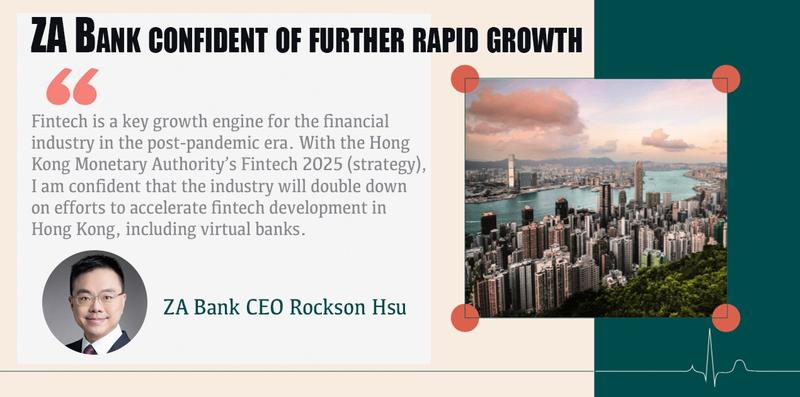 Top-grade commercial skyscrapers dot the skyline in Hong Kong's Central district - the world's priciest office location. (PHOTO / PROVIDED TO CHINA DAILY)
Top-grade commercial skyscrapers dot the skyline in Hong Kong's Central district - the world's priciest office location. (PHOTO / PROVIDED TO CHINA DAILY)
ZA Bank, which transformed the way people bank in Hong Kong, turned 2 years old this year while the virtual bank evolved into a more income-generating model and racked up a number of firsts, CEO Rockson Hsu said.
The bank is operating in a nascent market, and Hsu said it may be too early to comment on consolidation in the sector.
“Yet, fintech is a key growth engine for the financial industry in the post-pandemic era. With the Hong Kong Monetary Authority’s Fintech 2025 (strategy), I am confident that the industry will double down on efforts to accelerate fintech development in Hong Kong, including virtual banks,” Hsu said.
A consultancy has estimated a HK$76 billion ($9.7 billion) market opportunity for the local virtual banking industry by 2025
“As Hong Kong heads into a new era of ‘virtual banking 2.0,’ ZA Bank will continue to delight users with every interaction of financial products and services with our integrated financial platform, covering banking, insurance and investment.”
In the Fintech 2025 strategy, one of the five focus areas is that “all banks go fintech”.
ALSO READ: HK online banks to spread wings, offering business loans
“This demonstrates that the new, tech-driven banking model of virtual banks has proved to be successful in the city and will be replicated across the industry. We can expect the differentiation between ‘traditional’ and ‘virtual’ banks to become irrelevant, as all banks are encouraged to fully digitalize their operations,” Hsu said.
A consultancy has estimated a HK$76 billion ($9.7 billion) market opportunity for the local virtual banking industry by 2025.
ZA Bank is noted for its tech DNA and aspires to be a game-changer, having acquired over 500,000 customers. Its corporate parent is ZA International, the global arm of ZhongAn Online.
“We are the first virtual bank in Hong Kong; we launched a number of market-first products; today, we are Hong Kong’s No 1 virtual bank in terms of customer deposits, loan and advances and number of users (as of Dec 31). Looking back on the past two years, I like to summarize our commitment to the three policy objectives of virtual banking in three keywords: fast, different, and inclusive,” Hsu said.
ALSO READ: Competition for deposits becomes virtual reality
“Fast” relates to how ZA Bank drove Hong Kong’s fintech development to the next level by changing the way how Hong Kong people bank.

“Our proprietary eKYC system enables a seamless, fully-digital customer onboarding process. A user can open a ZA Bank account with a mobile phone and (a Hong Kong) ID card. Currently, the record of the fastest account opening is less than two minutes.”
As for being “different”, with gamification being an integral part of its app, the ZA Bank has made banking fun. The game-room feature ZA Quest invites users to unlock quests associated with products and services, such as spending with the ZA Card, paying credit card bills, or inviting friends to open an account. And they get rewarded.
“This year we introduced a major revamp to our app, and among the new functions is a poll section where users can vote for what they would like to see in our updates.”
 Shops are closed for business as protesters gather in Causeway Bay on Aug 5, 2019. (PHOTO / CHINA DAILY)
Shops are closed for business as protesters gather in Causeway Bay on Aug 5, 2019. (PHOTO / CHINA DAILY)
Being “inclusive” means that the bank believes the launch of virtual banks supporting Hong Kong’s entry into the smart-banking era will further promote fintech and innovation and offer a new kind of customer experience.
Referring to aspirations of being the game changer, Hsu says this means that ZA Bank dares to challenge the status quo.
“Our No 1 position is not defined by a single product or service, but rather our competitive edges and mindset. With our community-driven approach, we believe the best way to address users’ pain points with banking services is to listen. That is why we are dedicated to co-creating products and services that truly meets users’ financial needs. By voting in our app, users are invited to offer guidance in our product road map,” Hsu said.
“Technology is the heart and soul of a virtual bank like us. We have over 600 colleagues, and 40 percent are IT and engineering talents. This enables us to grow at speed with one app iteration every three weeks, building the most comprehensive suite of products and services in the local virtual banking community in two years.”
ALSO READ: Banks embraces fintech application as business opportunity
Hsu said he believes word-of-mouth is better than any advertising, and he is glad that the obsession with user experience has earned the recognition of users who are pleased.
“The ZA Card is now one of the most actively used Visa cards in Hong Kong, where a user spends with the card once in every two days on average. Among the young population aged between 20 and 29 years, 1 in every 5 is banking with us, with each of them using 4.5 products on average.”
Hsu said the bank’s new, tech-driven service model has gradually gained users’ trust. Last year alone, the virtual banking community attracted 800,000 new users, doubling its growth in 2020, according to the Hong Kong Monetary Authority.
In insurance, ZA Bank has an advantage considering that corporate parent, ZA International launched the integrated financial brand “ZA” in 2019
“Over 1.2 million virtual bank accounts have been opened so far, with ZA Bank’s user base crossing half a million, or 6 percent, of Hong Kong’s total population. This pace of growth in two years is impressive compared with some prominent digital banks such as N26 and Monzo, which respectively acquired 300,000 and 250,000 users in the same period.”
In insurance, ZA Bank has an advantage considering that corporate parent, ZA International launched the integrated financial brand “ZA” in 2019. ZA Bank became the first virtual bank in Hong Kong to be the agent of insurance products, and is the only local virtual bank that provides insurance.
The bank has a strong funding base.
“ZA Bank has over HK$7 billion in customer deposits, up 17 percent year-on-year, accounting for about 30 percent of the market share among virtual banks in Hong Kong. We also posted over HK$2.5 billion in loans, up by about four times year-on-year, representing 40 percent of the total loan balance of virtual banks,” Hsu said.
“Indeed, building up assets is integral to every financial institution to maintain efficient operations for users, and most importantly, to build trust with users and investors. ZA Bank is lucky to be able to stand out from a highly competitive market.”
Net interest income increased 229 percent from the year before to HK$86 million, while net fee and commission income grew 45 times from last year to HK$52 million.
Hsu is confident the bank will be able to sustain rapid growth, as it continues to build a balanced mix of profitability with dynamic sources of income, particularly from insurance and the investment businesses, which is the next frontier.


